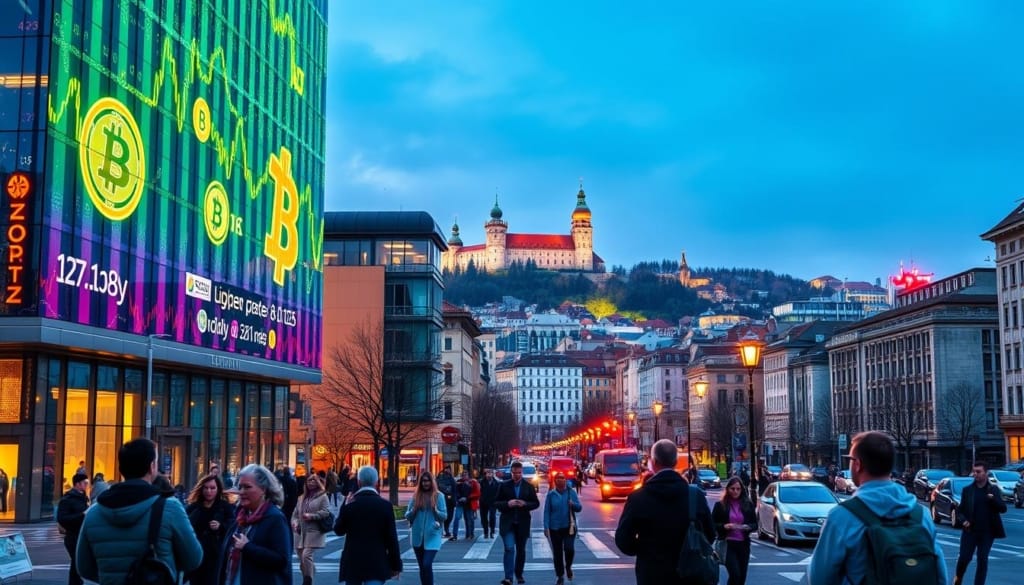Slovenia Crypto Adoption Surges as Ljubljana Tops Global Rankings
Slovenia crypto adoption has taken a bold leap forward—Ljubljana, the nation’s charming capital, is now officially the most crypto-friendly city in the world, according to the 2025 Crypto Cities Index published by Multipolitan.
This announcement sent ripples through the global crypto community. With more than 150 crypto ATMs, an active blockchain startup scene, and widespread retail acceptance of Bitcoin, Ethereum, and stablecoins like USDT, Ljubljana has emerged as a global epicenter for digital currency innovation.
In a world where many governments still waffle over crypto regulation, Slovenia has planted its flag and fully embraced Web3. But how did a small European capital outpace tech giants like Singapore, Zurich, and San Francisco? The answer lies in strategic foresight, community-driven innovation, and a decade of proactive regulation.
Ljubljana’s Rise: A Blueprint for Urban Crypto Integration
Laying the Regulatory Groundwork
Slovenia’s early decision to provide legal clarity around digital currencies created a fertile environment for innovation. Even in the mid-2010s, Ljubljana began treating crypto not as a threat—but as an opportunity.
This regulatory foresight allowed startups and developers to experiment and build without fear of unclear legal repercussions, positioning the city ahead of slower-moving jurisdictions.
According to the European Blockchain Observatory, Slovenia’s proactive engagement with blockchain legislation helped solidify investor confidence, sparking early infrastructure development like crypto ATMs and wallet-friendly POS systems.
Key Milestones in Ljubljana’s Crypto Journey
Ljubljana’s crypto maturity is more than just ATMs and Bitcoin cafés. Several defining moments fueled its rise:
- Blocksquare’s $1 Billion Deal: The homegrown real estate tokenization platform, Blocksquare, made headlines when it secured a $1B partnership with Vera Capital, showcasing the city’s appetite for high-stakes innovation.
- Formation of Blockchain Alliance Europe: This industry coalition has become a cornerstone of Slovenia’s blockchain ecosystem, promoting collaboration, advocacy, and tech standardization.
- Integration of Crypto in Daily Life: Dozens of retailers—from restaurants to gas stations—now accept crypto payments, normalizing its use beyond speculative trading.
What Makes Ljubljana the World’s Crypto Capital?
Real Infrastructure, Real Adoption
While many cities host crypto conferences and VC meetups, Ljubljana offers something rarer: real-world usage. Over 150+ crypto ATMs operate across the city, and even small businesses routinely accept digital assets.
The government’s tolerant approach toward decentralized finance has made Slovenia an attractive destination for digital nomads, Web3 founders, and fintech startups looking for a crypto-native culture without the red tape.
A Tight-Knit, Collaborative Ecosystem
Unlike mega-cities where tech scenes can be fragmented, Ljubljana thrives on its collaborative ethos. The synergy between government, academia, and startups—backed by initiatives from Blockchain Alliance Europe—has created a uniquely integrated ecosystem.
The result? Seamless innovation pipelines, active public-private partnerships, and strong alignment between regulatory direction and technical development.
Could Regulation Undermine Slovenia’s Crypto Success?
Despite Ljubljana’s meteoric rise, the road ahead isn’t without obstacles. In 2026, the Slovenian government plans to implement a 25% tax on personal crypto profits.
While designed to bring crypto under the national tax umbrella and increase state revenues, critics argue this move could threaten Slovenia’s current momentum. The tax may:
- Discourage retail participation
- Prompt startups to relocate
- Undermine the city’s reputation as a pro-crypto haven
Still, Slovenia’s officials insist that the tax is part of a broader goal: sustainable Web3 integration, not short-term deterrence. If balanced correctly, it could be a case study in responsible crypto regulation.
Forward-Looking: Can Slovenia Hold Its Lead?
Slovenia crypto leadership isn’t just a fluke—it’s the result of a decade of vision, experimentation, and policy alignment. Yet, maintaining this lead will require agility.
To stay ahead, Ljubljana must:
- Refine its tax policy to retain startups and talent.
- Continue cross-border partnerships to scale adoption and investment.
- Double down on education and blockchain literacy to future-proof its population.
Other cities are taking notes—and likely drafting crypto strategies of their own. For now, Slovenia stands as a rare example of how even a small country can lead a global technological transformation when regulation, innovation, and community are aligned.
FAQ: Slovenia Crypto
What makes Slovenia crypto-friendly?
Slovenia’s crypto-friendly reputation stems from early regulatory clarity, robust infrastructure like over 150 crypto ATMs, and a vibrant blockchain startup community centered in Ljubljana.
Why was Ljubljana ranked the most crypto-friendly city in 2025?
Ljubljana topped the 2025 Crypto Cities Index due to its real-world adoption of digital currencies, business acceptance of crypto payments, and supportive government policies.
How does Slovenia regulate crypto?
Slovenia offers a clear legal framework for crypto assets but plans to introduce a 25% tax on personal crypto profits in 2026, which may impact future adoption and business interest.
What companies are driving Slovenia’s crypto innovation?
Key players include Blocksquare, which leads in real estate tokenization, and Blockchain Alliance Europe, which fosters collaboration among regulators, developers, and businesses.
Will Slovenia’s crypto tax hurt its Web3 growth?
The 25% crypto tax could create friction, especially for startups. However, if implemented with exemptions or incentives, it may support long-term regulatory maturity.
Conclusion: Slovenia’s Crypto Moment—and What Comes Next
Slovenia crypto adoption has set a global benchmark. Ljubljana’s combination of open regulation, local innovation, and cultural acceptance of digital assets has created a sustainable crypto ecosystem that rivals those in much larger countries.
But with global competition heating up and local tax changes on the horizon, Slovenia’s next chapter will test whether innovation can survive tighter oversight.
If it succeeds, it won’t just be a leader in crypto—it could become a model for digital transformation across Europe and beyond.

